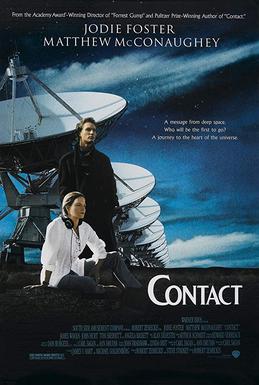Contact: The Twin Paradox
At the climax of the movie Contact, Ellie is chosen to go through the new space traveling machine. Right before her trip, she starts a timer on her watch. As Ellie travels at close to the speed of light, we see from her perspective a long trip in which she travels through space and ends up on an extraterrestrial beach, where she is greeted by her dead father (or alien dressed as her dad, I'm not really sure). When she returns back to Earth, she checks her watch which reads that 18 hours have passed. However, she soon realizes that in the perspective of everyone else, the spacecraft "failed" and she fell straight through the device's rings into the ocean. How did this happen you ask? The twin paradox. The producers, however, got it slightly wrong. What should have happened is the people on Earth should have experienced a longer wait for Ellie's return, and Ellie should have felt like she was only gone for a short time. This is because time dilation affects all clocks, including biological clocks. The people on Earth are measuring in "proper" time, while Ellie is the one experiencing time dilation. If Ellie had been gone for 18 hours on her clock, then the people on Earth should have been waiting a lot longer than 18 hours. The revisions the movie would have to make could completely change the outcome of the movie. In the movie, since Ellie's trip only seemed to take a couple seconds, the the observers on Earth did not believe anything that Ellie told them. If the movie had gotten the twin paradox right, the people on Earth would have waited so long for her return that they would possibly be more inclined to believe her story. This would force the directors of the movie to change the compelling ending where the government finds evidence, basically proving Ellie's claims, and keeping it classified.

Careful. You actually have the terms backwards. "Dilated" time is always the longer time; that's why the word dilated is used. It means wider or larger. That's the time experienced by the observers on Earth. Ellie measures the shorter time. In other words, her clock ticks off less time. That's the proper time.
ReplyDeleteI think you're right about why the movie's writers went with the ending they did. What I was hoping you could come up with was a compelling, dramatic ending that still got the physics correct. What happens in your script when Ellie returns?